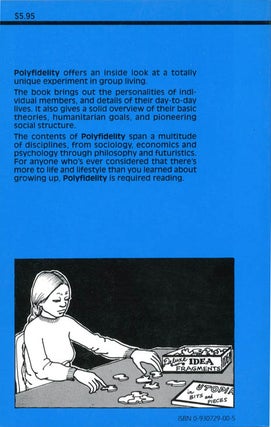181.
Polyfidelity: Sex in the Kerista Commune and Other Related Theories on How to Solve the World's Problems.
SF: Performing Arts Social Society, (January) 1984. First edition. 8vo. Glossy wrps., 254pp. Illustrated throughout with drawings, cartoons and photographs. "Polyfidelity offers an inside look at a totally unique experiment in group living. The book brings out the personalities of individual members, and details of their day-to-day lives" (back cover blurb).
Contents include chapters titled "On Beyond Jealousy", "Getting Out of Psychic Adolescence", "Do-It-With Friends Mental Health Techniques of the Gestalt-O-Rama Process", and "Keristans on the Donahue Show", a transcript of two members' appearance on the Phil Donahue TV talk show in July 1980.
The Kerista Commune was founded by Bro Jud (John Peltz Presmont) and Even Eve (Eve Furchgott) in 1971 and based in the Haight-Ashbury district of San Francisco (though its origins lay in a utopian community started in 1956 by Presmont in New York City). Centered around alternative and non-monogamous lifestyles, its members, which ranged in number from between five at its founding to twenty-five at its dissolution in 1991, were required to undergo Gestalt-O-Rama, a group-oriented personal growth process during which anyone could be called out for non-utopian thought or action. Each member was assigned to a 'family group', or 'Best Friend Identity Cluster', composed of up to eighteen people (nine men and nine women), with a rotational sleeping schedule to determine who slept with whom every night (to avoid coupling-up).
The commune also developed its own vocabulary, and coined the terms polyfidelity (the erotic preference and family style of Keristans) and compersion ("the opposite of jealousy, positive feelings about your partner's other intimacies", ie. polyamory). Income was shared between the Keristans, some of whom had outside paying jobs, but the community also operated its own businesses, most notably Abacus, Inc., an early Apple Mac computer vendor in San Francisco (as well as selling Macs, Abacus provided comprehensive consulting services to corporate clients, few of which knew they were dealing with members of a permissive commune). The commercial success of Abacus helped expose divisions at Kerista, and in November 1991 Bro Jud left the commune, whose membership voted to dissolve it a month later.
Minor lower left corner crease to first few pages, o/w Fine.
 Back to top
Back to top



